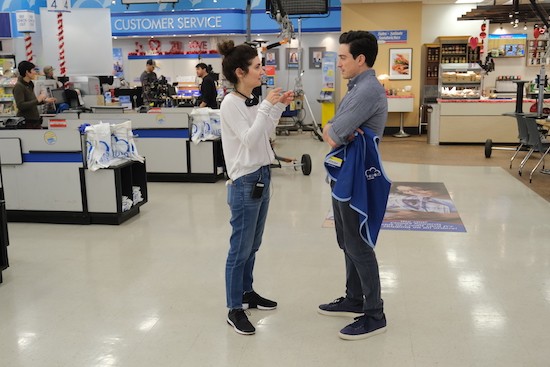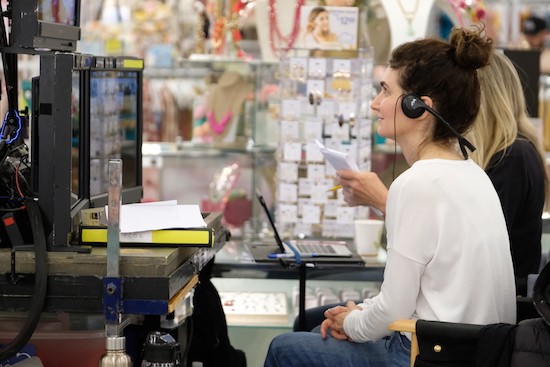SUPERSTORE: Kris Lefcoe Reflects on Making Her Directorial Debut with ‘Cereal Bar’
February 13, 2020 by Marisa Roffman

SUPERSTORE — “Cereal Bar” Episode 515 — Pictured: (l-r) Kris Lefcoe and Ben Feldman — (Photo by: Patrick Wymore/NBC)
[Warning: This post contains spoilers for the Thursday, February 13 episode of SUPERSTORE, “Cereal BAr.”]
SUPERSTORE’s Valentine’s Day installment marked an important off-screen milestone for director Kris Lefcoe: it was her debut stepping behind the camera for a television episode.
Lefcoe—an indie filmmaker whose work has been shown at festivals like Toronto International Film Festival and SXSW—participated in NBC’s Female Forward initiative, which is a program that aspires to bring gender parity to television directors. In the highly-coveted program, each participant shadows on shows and is then set up on meetings at NBC, with the guarantee of directing an episode that year.
Here, Lefcoe talks about why this directing program was right for her, her history with SUPERSTORE’s Mark McKinney, and how she tackled some of the most challenging parts of “Cereal Bar”…
What led to you applying for NBC’s Female Forward initiative?
I’ve been trying to break into television directing for a really long time. And it’s just very tough to get that first episode, even for directors with experience in other things like features, shorts, commercials, and all that stuff. It’s extremely tough to just get someone to hire you to direct an episode of television if you’ve never done it; that’s true of men and women, but particularly of women. I had been told by more than one of my agents over the years, “You’re really talented, we totally support your career, but we can’t get you any work in TV, because you’re a woman but keep on working at it.”
What I did was a couple of years ago, I took matters into my own hands and made my own television pilot that I wrote, directed, and produced, so that I could at least show that I know how to make something that looks like TV. And that opened a lot of doors for me and created a lot of relationships, because it won a lot of awards and people in the industry saw it.
So the next step was how do I now really get someone to pull the trigger and say yes for my first episode of a real show? That’s why I choose to look to these programs. I’ve been directing for a long time, and I didn’t really just want to shadow. I think you can get a lot out of shadowing and I have shadowed before, but I feel like, for me, NBC was the program to apply to because it’s actually a job. And then after you shadow for two episodes, you direct an episode of a show. And that’s really what makes the NBC program different from all of the other programs out there—it actually gives you your first job and your first credit as a television director, and that’s what I needed as my next step.

SUPERSTORE — “Cereal Bar” Episode 515 — Pictured: (l-r) Kris Lefcoe — (Photo by: Patrick Wymore/NBC)
What was your relationship like with the other participants in the program?
I mean, I really can’t say enough about the camaraderie and support that we’ve all provided for each other. This group is such an amazing group of women. Right from the beginning, we all bonded and have just been helping each other out every step of the way. And even just to have somebody to unload on or just reach out to spontaneously. I’m the only one who lives in New York, everybody else lives in LA, but we have a text thread that we’re all on and we’re always sending each other stuff. And even though I live in New York, I feel like I’m still able to, you know, reach out to those guys anytime.
I just love all of them. There is a little bit of difference between the [approach for] comedy—there are two of us who are who are doing comedies and three that were on dramas—in terms of the process and certain differences, because what it’s like to direct a comedy show is different from directing like a procedural drama. But I feel like the sense of just total support and wanting to help in any way that we can each other in our career paths remains across the whole group.
How familiar were you with SUPERSTORE before you actually directed the series? And you knew Mark before you started, correct?
I already liked SUPERSTORE before any of this happened, and in particular, I was really interested in the way that this show kind of insidiously addresses issues that most shows wouldn’t touch in the context of a half-hour family comedy: immigration, workers’ rights, unionizing, and stuff like that. This show’s like the ALL IN THE FAMILY of our time, and that’s something I’m really interested in as a creator myself; I’m always trying to find ways of being sneaky about entertaining people, while also bringing up stuff that I care about, that might not be a natural match for a sitcom. And I think they do that so well on the show, because it doesn’t feel like preachy or a very special episode. It’s just a part of the lives of the characters. And that’s what I think is the real brilliance of SUPERSTORE.
So I was really excited when I did get the opportunity to interview for the job. When I found out that I had that interview, I watched every episode of the show so that I would be an expert and have a point of view on the way that it’s made and understand what they would be needing from me. I feel like a guest director is really coming in and just trying to make the showrunners’ jobs easier.I think in order to do that, you need to know the show, if not as well as they do, as well as you possibly can.
My Mark story, it is a pretty cute story. My very first job in the industry, I was a PA/driver on THE KIDS IN THE HALL. I was still a student, and my very first task that I was assigned in that job was to pick up Mark McKinney at his home with a cappuccino and drive him to set.
And I can report that Mark was lovely to me, even before his coffee, and I was just a lowly, lowly PA, showing up in a van. He was so sweet, respectful, and kind—and he is still that way. It felt amazing to kind of come around and close the circle and have him be a star on my first episode of television. He actually told me when I was shadowing, “I remember a million years ago and you were a PA on KIDS IN THE HALL, and you told me you’d be directing me one day, and here we are!”
I don’t remember telling him I was going to direct him one day, which was pretty ballsy thing for the PA to say to star of the show! But I do remember having conversations with him about that I wanted to be a director. I did want to cast him in a movie that I was trying to put together. I guess I probably did tell him that!
Did either of you bring a cappuccino to the other on your first day?
No, but that would have been pretty adorable. He did crush my head, which was was like a KIDS IN THE HALL bit. Colton [Dunn] took a video of crushing my head, which I think he’ll post somewhere when the episode airs, so I do feel pretty honored by that.
The episode was a big one, in that there was another Cloud 9, Mateo’s new office, and the addition of a new set piece in the cereal bar. How did you approach all of those elements that aren’t traditionally there in other episodes?
It makes it really fun. Every production has its own challenges. And if you’re addicted to production like I am, those are the things that just are create a lot glee, because it’s like how the heck are we going to do this now?
So we did shoot in the break room and dressed it as the other store’s break room. My first shot in the break room was as the Chesterfield break room and we just had to figure out [that look]. It’s supposed to be this cookie cutter, big box store, where all of the stores would basically have the same design. But of course it would look slightly different. So I just proposed that we turn it around, so we put the things that were in the front of the room at the back and the things that were in the back room at the front. Then it was about set dressing, and the art department on SUPERSTORE, they’re all so brilliant, amazing, and talented. And we actually shot that Chesterfield scene on day one of production for me, which was fun and a little bit daunting to be in the break room on day one. It’s notoriously a very tough set for directors.
My entire day two was in the break room, which was playing as the normal break room. And usually on SUPERSTORE, they try to schedule the break room shots for the Friday or at least a Thursday, especially with the newer director, because it is a tough set—there’s always a million people in there, everybody has lines, and you have to cover it in a certain way. I definitely got some warning from the production manager and the AD about that we were about to embark on shooting more pages in the break room in a day than any director in the history of SUPERSTORE on day two of my career directing television. But you know what? I nailed it. So I felt really good about that.
The whole rest of the week kind of flew by. I’m not going to say it was not a challenge—that morning of day two was my most challenging time on set. But I feel like the fact that I got everything I needed in that room and everything I needed the whole week, I’m just really proud of it.
Mateo’s office, that was something that actually scared me, because that set—one thing that’s great about shooting on the lot is that generally most of the walls move, things are really easy to deal with. That little tiny utility closet is a set that is so tiny and it is not as flexible as the other sets on SUPERSTORE.
That was one that I kind of flagged early on when I was looking at the maps and going, “How the heck am I going to have a master getting this?” Because all of the other episodes where that plays as the utility closet, if you’ll notice, the master shot is a very high angle shot; it looks like almost a security camera. And that has played into the story, it has been suitable for the stories that have played in those that room before. But for this, it wasn’t suitable to use a shot like [that]. It felt wrong to me to do it that way. So that was a challenge to figure out how I was going to cover the scene in there and make it work. So we ended up actually shooting directionally.
Usually on SUPERSTORE, it’s really nice and easy because we use three cameras and we cross-cover both actors, which is great for improv as they’re doing a take—you’re getting it from three angles at once. So it comes together beautifully, even if the cast improvs and talk over each other. And so that makes the day go really quickly. But in the utility closet that is now Mateo’s office, we couldn’t do that. So we shot it the old-fashioned way and just shot in one direction and then turned around to get the other direction.
Thank you Lauren Ash and Colton Dunn for making me almost pee my pants directing Superstore. Pretty sure pee puddles are a safety hazard on set so. Next time be less funny. Tonight at 8pm/7c pm NBC! pic.twitter.com/vqFD7gkvb6
— Kris Lefcoe (@KrisLefcoe) February 13, 2020
The episode also had a bunch of different tones you had to juggle as the employees were dealing with their new bosses, Dina had a crazy romance, and Garrett was trying to fake emotional distress to get out of work. What was the challenge in balancing those different elements?
It’s a very insightful comment about all the different tones in this episode, because it’s true. There were some things that were really heightened, some stuff they don’t normally do on SUPERSTORE in terms of like the whirlwind romance with Dina. But I loved that storyline so much, I was so excited to shoot it.
My approach to all of that is really just my approach to directing in general, which is to just keep things grounded and find the realism in the scene, right from the script on. And just for me, it’s my own taste: if an actor can can play the scene for realism and just let the writing be funny, it’s hilarious. And there’s so many brilliant comedic performers on this show, it’s insane. So it doesn’t really take a lot of direction to make the funny on SUPERSTORE. For me, it was just making sure that moments were that were grounded felt grounded and real. Even though there are tonal shifts, none of it feels like it’s been carried off into another show or another dimension.
This is also a show where a number of the cast members have either written or directed episodes. How did that play into how you were able to work with them on set?
It’s just nice to be able to talk with an actor when you know they’ve also directed the show. Because in a way, they know what you’re going through. [Laughs.] You don’t even have to say anything, but they knew that I was shooting nine and a half pages in the break room. They know what that means. It just helps to keep everybody focused.
There’s a shorthand when you’re directing an actor who’s also directed. And that’s helpful. But at the same time, you don’t really think that much about it. It’s really just about taking it moment by moment, and making sure you get what you need in each moment of the script. But they’ve directed some of the best ones.
Is there anything else you want to share about the experience?
I just honestly had a blast with every single part of it. It was so, so fun. [During] the shadowing, I learned a ton. I feel like I’ve made some lifelong friends. And I really can’t think of a better show to have had as my first experience as a television director, because it’s such a great group. And everyone is so easy; it’s an easy set. I know that directing television can be a bit of a nightmare, but working with Jonathan and Gabe, it’s so easy, and the writing is so funny, and the actors are so funny, that I just feel really lucky.
SUPERSTORE, Thursdays, 8/7c, NBC
RELATED:
- NBC Renews SUPERSTORE
- SUPERSTORE: ‘Cereal Bar’ Photos
- The SUPERSTORE Cast Teases Sandra and Jerry’s Wedding
- The SUPERSTORE Cast Teases ‘Favoritism’
- The SUPERSTORE Cast Previews a Tribute to Linda Porter’s Myrtle
- SUPERSTORE Bosses Dissect Cloud 9’s Big Union Move
- SUPERSTORE Adds Dean Norris as Dina’s Father
- SUPERSTORE Cast, Creative Team Mourns Linda Porter
- SUPERSTORE Bosses on the Delicate Balancing Act of the Season 5 Premiere
- SUPERSTORE Creator Explains the Show’s Unconventional Original Title
- SUPERSTORE’s Nico Santos Reflects on the ‘Difficult,’ ‘Triggering’ Season 4 Finale
- Inside SUPERSTORE’s Cloud 9 Pop-Up at Comic-Con
- On the Set of SUPERSTORE: Check Out Props and Costumes from the Comedy’s History
- SUPERSTORE: Colton Dunn Crashes Ben Feldman’s Interview
Follow @GiveMeMyRemote and @marisaroffman on Twitter for the latest TV news. Connect with other TV fans on GIVE ME MY REMOTE’s official Facebook page.
And be the first to see our exclusive videos by subscribing to our YouTube channel.
As an Amazon Associate we earn from qualifying purchases made through links/ads placed on the site.
Related Posts
Filed under Superstore
Comments Off on SUPERSTORE: Kris Lefcoe Reflects on Making Her Directorial Debut with ‘Cereal Bar’



Comments